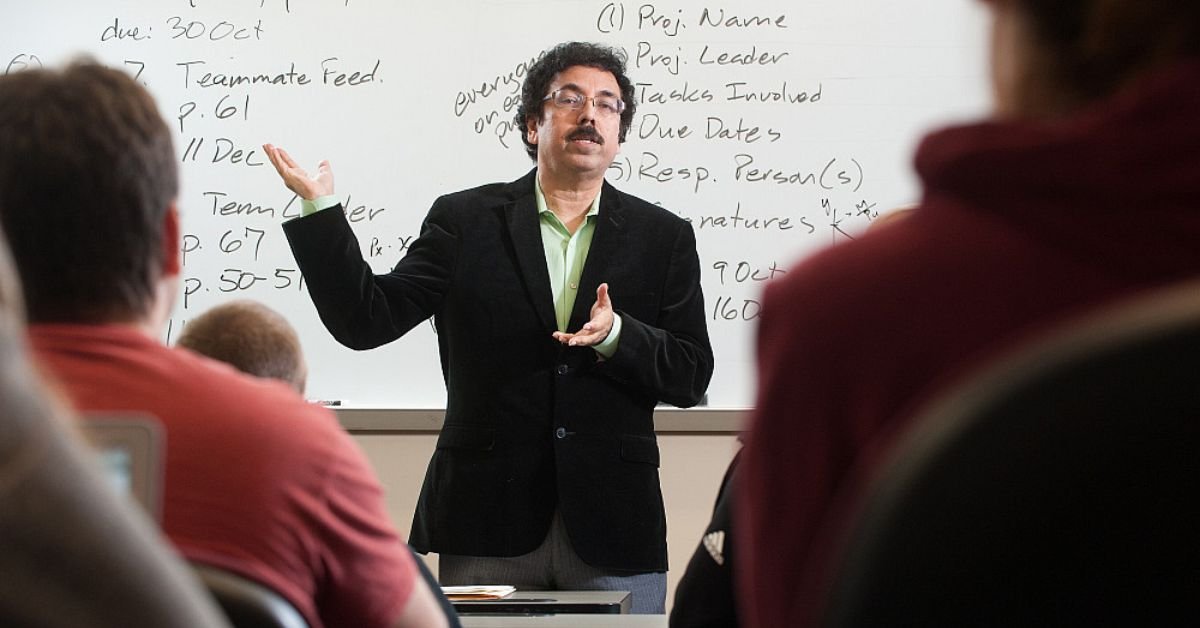Students gain real-world international business skills through Global Classroom project
How we communicate is always evolving. A hundred years ago, getting a message to someone a town over could take hours. Today, we can speak to people on the other side of the world with the tap of a screen.
Subir Bandyopadhyay, Indiana University Northwest professor of marketing, knows this better than most. He has a deep knowledge of international business and has traveled all the way to India as a Fulbright Scholar to continue his research.
During his time in India, he came up with a new idea: a project that would allow students to collaborate with peers across the world.
“I made a lot of good connections with the faculty members in India, and we talked about the types of teaching we do,” he said. “This idea came up because with technology, we don’t always need cultural exchange programs to move a class to another country. Why not do a virtual trip?”
To set his idea in motion, Bandyopadhyay needed funding, and it came in the form of an IU Global Classroom Fellow grant. With those funds, he was able to travel to India and meet with Bikramjit Rishi, a professor at Shiv Nadar Institution of Eminence.
“As an educator, I am constantly seeking opportunities that enrich students’ learning beyond traditional classroom boundaries,” Rishi said. “The Global Classroom project offered a unique chance to immerse students in a truly intercultural, collaborative experience.”
The project takes a fundamental topic in business and marketing communication and puts an international spin on it.
“IU students evaluated a local company’s product mix and thought of how to market in India,” Bandyopadhyay said. “The target market strategy here in the United States may not match the target market over there.”
To best understand the right appeal and marketing approach that would work best in India, Bandyopadhyay’s students collaborated directly with Rishi’s students – separated by more than 7,000 miles – via Zoom and WhatsApp.
“Their Indian counterparts would act as consultants about the Indian consumer, and IU students then acted as their consultants about the U.S. market,” Bandyopadhyay said.
IU students worked in tandem with students in India to really understand each other’s culture and how a marketing plan would be affected by those norms. In the end, students on both sides of the project came away with a deeper understanding of how cross-cultural communication works in the real world.
“Beyond learning how to conduct marketing research in a cross-cultural setting, I hoped that students internalized the importance of empathy, active listening and open-mindedness. These (skills) are foundational to any successful global collaboration,” Rishi said.
After Bandyopadhyay and Rishi began the project, several challenges arose. Time zones were one of the biggest — students at Shiv Nadar were 10-and-a-half hours ahead of Central Time. Students also adjusted to different academic expectations, project approaches and work ethics.
“These challenges became valuable learning opportunities,” Rishi said.
Over the course of the project, students became more adaptable, sensitive to cultural differences and able to resolve conflicts.
“It’s similar to a real job situation,” Bandyopadhyay said. “More and more corporate jobs are global in nature. You have to work with people from different cultures, and as undergraduate students, learning those things is a unique experience.”
Despite some of the challenges, the Global Classroom project was a resounding success, with many students excelling at communicating with their peers in India. In fact, Bandyopadhyay has plans to offer the project in future sections of his consumer behavior course.
“This is a very small way we instill in our students the importance of working with people from other cultures and countries,” he said.
However, it’s no small feat to help students gain an international perspective without ever leaving home. Rishi sums the project up best as a microcosm of the global workplace.
“Ultimately, it prepares students to be more agile, inclusive and globally competent professionals,” he said.











































